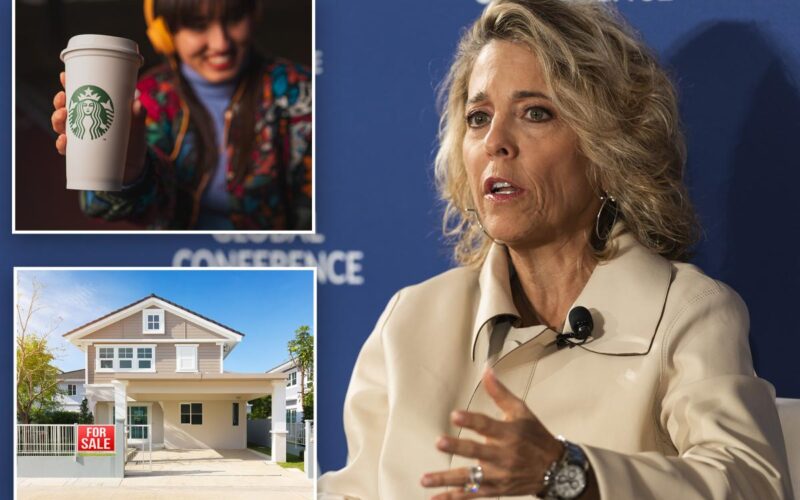Members of Gen Z need to curb their spending habits by giving up on Starbucks coffee and taking mass transit instead of Uber if they want to buy a home, says the chief executive of one of the nation’s largest realtors.
The Gen Z and millennial cohorts are experiencing difficulties that are no different from those of their parents and grandparents — particularly in New York — according to Pamela Liebman, CEO of Manhattan-based Corcoran Group.
She told Fortune that cash-strapped youths could make some simple changes in their spending to make home ownership work.
“Stop buying Starbucks coffee. I mean, stop spending money on things that are not necessary,” Liebman told Fortune last week.
“It’s tremendous how fast that little nest egg can add up,” she added.
Gen Z doesn’t seem so optimistic. While 90% of those born in the late 1990s and beyond say they hope to own a home someday, 62% believe that will not actually happen, according to surveys.
Still, Gen Z members and millennials should also rely on the subway instead of hailing rides on apps like Uber, Liebman advised.
“If you look at people who are taking an Uber instead of the subway, they’re buying their coffee, they’re buying their breakfast out, they’re spending money on things that are not necessary, they’re going out with their friends three nights a week, spending money on alcohol, food … these things definitely start adding up,” she said.
“The subway is definitely cheaper than an Uber.”
Liebman suggested another way to avoid unnecessary expenses — dinner clubs.
“Three nights a week, they’ll go to someone’s house, and they’re in charge of the cooking,” Liebman said.
“Young people now seemingly like to cook. I haven’t cooked in 30 years, but they love it.”
Even with those cash-saving tips, buying property in Manhattan is still a heavy lift.
The median price for a Manhattan property was $1.2 million for the third quarter of this year, according to a report by Miller Samuel and Douglas Elliman, while the average price of a home in Manhattan this past quarter was just under $2 million.
The outer boroughs provide some relief, but not by much. The median sales price of a property in Brooklyn was $1.05 million. The average sales price stood at $1.4 million.
The Gen Z and millennial cadres’ best bet may be to purchase property in Queens, where the median sales price was $730,000 and the average came to $794,621 in the third quarter of this year, according to the Elliman Report.
Liebman first joined Corcoran Group as a realtor at the age of 23 in 1984, working her way up the corporate ladder to become the chief executive.
The company does not disclose her salary, but the news site The Real Deal has reported that the heads of New York’s top realtor companies can earn anywhere between $400,000 and $3 million annually.
Liebman said it is just as hard to buy a home today as it was in decades past.
“It is just as tough,” she told Fortune.
“Back then, it was more difficult in some ways because you had fewer neighborhoods where people would live.”
According to Liebman, younger would-be homebuyers have more options than their forebears, given the higher number of areas that are more attractive to live in.
“If you think back to the 80s, the Meatpacking District wasn’t this highly desirable district,” she explained.
“All these areas in Brooklyn that are number one on people’s list, they weren’t there,” she continued.
“So you were sort of getting jammed into these, these few neighborhoods, Upper East Side, Upper West Side, maybe a little bit of Chelsea, and Flat Iron — I don’t even think we called it Flat Iron back then, Tribeca was just coming around. So everyone was squished in the same places.
“Today, you have a lot more options, so many more places to go,” Liebman added.
“But it’s always really hard to find those great rentals, or to find those first starter apartments.”
The Post has sought comment from Corcoran Group.








